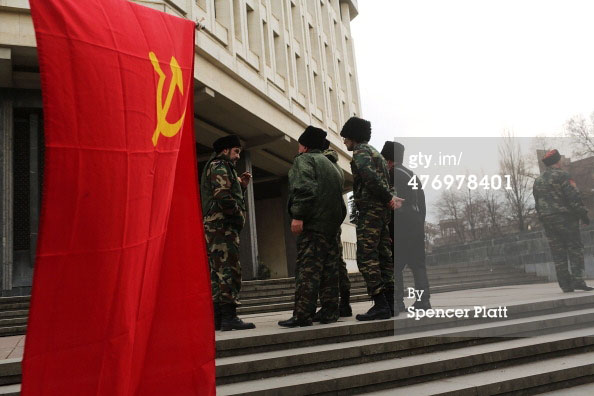Ukrainian dispute alarming among EU, UN

Photo By Spencer Platt (Getty Images) Collection News
Russian troops currently invading the Crimean Peninsula.
March 6, 2014
Under the leadership of President Vladimir Putin, Russian troops have invaded Ukraine, specifically the peninsula of Crimea, over this past weekend. With no end in sight, concerns are beginning to rise around the world over this epidemic.
This tirade began after Ukrainian President Viktor F. Yanukovych fled from Ukraine after protests about the president’s close relationship to Russia. Shortly after, Russia responded on Friday by deploying 16,000 troops over the weekend using planes, boats and helicopters to the Crimea peninsula. The troops demanded that Ukranian forces surrender without the use of arms.
Nations all around the world responded rapidly, leading to three emergency security council meetings of the United Nations since Friday.
At Monday’s council meeting, the Ukrainian Prime Minister Yuriy Sergeyev pleaded to the UN about Russia’s invasion of Crimea. His plea included a three page letter stating that the troops had moved to “seize, block, and control crucial government and military objects in Crimea.”
The letter also stated that Russia’s Black Sea Fleet Commander set a deadline at 10 p.m. eastern time on Monday that Ukranian forces had to lay down their weapons.
On Monday, Secretary of State John Kerry said that a majority of countries belonging to the EU and UN have threatened to cut off all trading to Russia if the invasion were to continue.
Putin ignored the threat by justifying his actions as, “An attempt to protect ethnic Russians in the region. It will be legitimate and correspond to international law because we have a direct request from a legitimate president and it corresponds to our interests in protecting people who are close to us.” He decided to continue his campaign.
The United States then upheld their threat by cutting all military relations between the U.S and Russia. Also, Canadian Prime Minister Stephen Harper said on Tuesday after speaking to President Obama that the Group of Seven leading industrialized nations were considering meeting in the near future, a move that would vividly exclude Russia. The G7 summit (seven industrialized nations meeting together) became the G8 summit in 1998 when Russia was formally included.
“Russia was on the wrong side of history for sending troops into Crimea. President Putin seems to have a different set of lawyers making a different set of interpretations, but I don’t think that’s fooling anybody,” President Obama said.
At the last security council meeting in New York, Russian Ambassador Vitaly Churkin said, “Legitimately elected authorities had asked for Russian assistance.”
It so happens that the “authorities” are in fact the original pro-russian president of Ukraine after Churkin displayed a written letter by former president of Ukraine Viktor Yanukovych asking for Russian assistance.
U.S Ambassador Samantha Power shot back at this remark by Churkin calling the action an “act of aggression” at Monday’s meeting.
Russia’s response on Tuesday was the test firing of a TOPOL RS-12M missile thought to be nuclear near the Caspian Sea.
Many politicians, from both Democratic and Republican parties, are calling out the president for his stance on the issue. This new Cold War type of tension has lead many to ponder whether more action needs to take place and what Putin is trying to accomplish. Could this be a return of the USSR?
Former presidential candidate John McCain stated in an interview with ABC that, “Russia has broken international law. I have a message for president Obama, wake up and get real.”
History has proven that tiraids such as this with former dictators Adolf Hitler and Joseph Stalin did not end with what President Obama seeks which is a “diplomatic solution.”
New information will rise in the upcoming days from this catastrophe regarding what British Foreign Secretary William Hague called, “Europe’s most serious crisis of the 21st century thus far.”
Check the Kaneland Krier Twitter page for breaking news in Ukraine.


